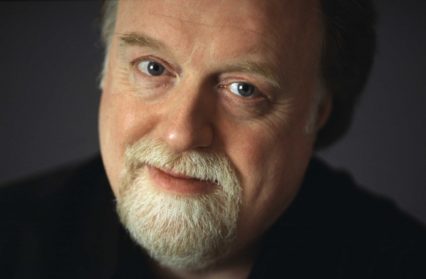The 2019/20 International Concert Series starts in style at St David’s Hall with the prestigious Moscow Philharmonic Orchestra on Wednesday 9 October. This performance juxtaposes the Slavic passion and intoxicating energy of Khachaturian and Rachmaninov with enchanting excerpts from Tchaikovsky’s Swan Lake and his patriotic tone poem Marche Slave. The concert closes with Rachmaninov’s rarely heard but resonant Fourth Piano Concerto, which is a work suffused with bluesy, heart-easing tunes and glittering virtuosity. And who better to appear as soloist on this piece than the acclaimed Peter Donohoe, who was the silver medallist at Moscow’s 1982 International Tchaikovsky Competition?
Peter has built an extraordinary worldwide career encompassing a huge repertoire over the last 40 years and is acclaimed as one of the foremost pianists of our time for his musicianship, stylistic versatility and commanding technique. In the 2010 New Year’s Honours List, he was awarded a CBE for services to music.
Neil Collins had a chat with Peter Donohoe about his return to the National Concert Hall of Wales for an evening of Russian classics…
Neil Collins: Where did your love of the piano begin?
Peter Donohoe: In the lounge of my family home when I was just about old enough to reach the keyboard.
Is Rachmaninov’s Fourth Piano Concerto a particular favourite of yours?
I would always hesitate to claim that any work is a favourite. However, Rachmaninov should really be included as one of the most inspired and genuinely original composers of all – a position undermined to some degree by the enormous popularity of a small number of his pieces – Concerto No 2 and Rhapsody on a Theme of Paganini being the most obvious. The considerably less frequently played Concerto No 4 – along all the composer’s last five works – is to me a very special piece for sure. Its infrequency in the concert hall is explained by two things: The first is that the style is immediately obviously very different from the immensely popular earlier style (from his Russian period up to the turn of the century as opposed to the period of his exile in the West). His first work – the first of the above mentioned five – to be published after his long break from composition when he fled Russia prior to the 1917 Revolution is this wonderful Concerto.
The second is its immense coordination difficulties between soloist, conductor and orchestra. I would say it is the most difficult concerto I ever encountered from this point of view. It is thus avoided unless there is a lot of rehearsal time, and the conductor and orchestra must be by definition of the very highest level. It is then, perhaps that one could claim that it is amongst Rachmaninov’s greatest achievements, with a sadness and a nostalgic emotional level unsurpassed in any other concerto I know.
Have you worked with the Moscow Philharmonic Orchestra or with Yuri Simonov before?
Yes, many times in both cases in the early days of my long association with Russian musicians, and not necessarily together. One of the last times maestro Simonov and I worked together was in the complete works for piano and orchestra by Tchaikovsky at the Edinburgh Festival with the Royal Scottish National Orchestra, which was a truly wonderful experience. As well as inviting me to play later many times, it was Moscow Philharmonic Orchestra playing with me in the final of the Tchaikovsky Competition.
What makes Russian music so powerful and sets it apart from the rest?
I don’t think it is. All music is powerful in its different way. The Russian personality is very direct emotionally and it shows in all art forms. This is what makes it so immediate and some of the music very popular with audiences. However, in reality that popularity is based on a very small number of works compared to the music of certain other countries – in particular of course German music. But Russia, Russian culture, and the Russian personality is very powerful in so many different ways. It is after all gigantically bigger than any other country, which will always show in its character.
How does working with a Russian orchestra compare with British orchestras?
That depends upon whether or not you are yourself Russian or British; that is to say whether you are a nationally known soloist in your own country or a guest artist. There are many stylistic differences of course, much too complex to go into here. However, the level of orchestras in both countries is so high that I certainly wouldn’t express a preference. If you were to ask the same question of a Russian piano soloist, I have a feeling that the answer might be similar.
How about the difference between Russian and British audiences?
A very similar answer. Soviet education in the arts was the greatest in history, so the audiences during the Soviet era were the most aware in the world of what we performers were doing and of the music itself. They were also very partisan, and I myself was the lucky recipient of that wonderful support, which has lasted until the present day.
You are a firm favourite with St David’s Hall’s audiences. Do you enjoy performing in Wales and any Welsh events in particular?
Thank you, that is very nice to hear. It is one of my very favourite halls and public anywhere in the world. I was Artistic Director at the Fishguard Festival from 2013 to 2019 and I have had a very close relationship with Wales all my life, and always love to return.
For more information on the programme and ticketing, you can visit www.stdavidshallcardiff.co.uk
or call the Box Office on 029 2087 8444.












